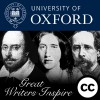Beowulf
The title of this collaborative project, 'Great Writers Inspire', naturally brings up several questions, most importantly of which is, 'What is a Writer?' In his talk on the Old English poem Beowulf, Francis Leneghan discusses that very concern. The term 'author' does not convey the same static quality in the Anglo-Saxon period as it does in the modern day. Beowulf could have existed in a multiple of versions, depending on how many Anglo-Saxon poets (scops) were around to interpret and re-tell the tale, much like the many interpretations of Shakespeare's 'Romeo and Juliet'. He also discuses the poet's taste for poetic license, taste, and embellishment that his own character, Beowulf, possesses. The poet invites the audience to consider the complex role of oral poetry, and how the audience - both Anglo-Saxon and modern - should interpret this work. Is this particular poet's rendition of events true? Is Beowulf a less trustworthy individual since he embellishes the nature of the fight when reporting back to Hygelac's court? Every performance and reading reshapes the poem and how we approach it, even to the modern day. The Beowulf-poet, in a sense, is more of a collective noun than an individual author. Also, if you want to hear what Old English sounds like, check out 2:25-2:32 to hear Leneghan speak the opening lines of the extraordinary poem, or 6:27-7:01 to hear the section in which Hrothgar's poet praises Beowulf by comparing him to the valiant men of old.




